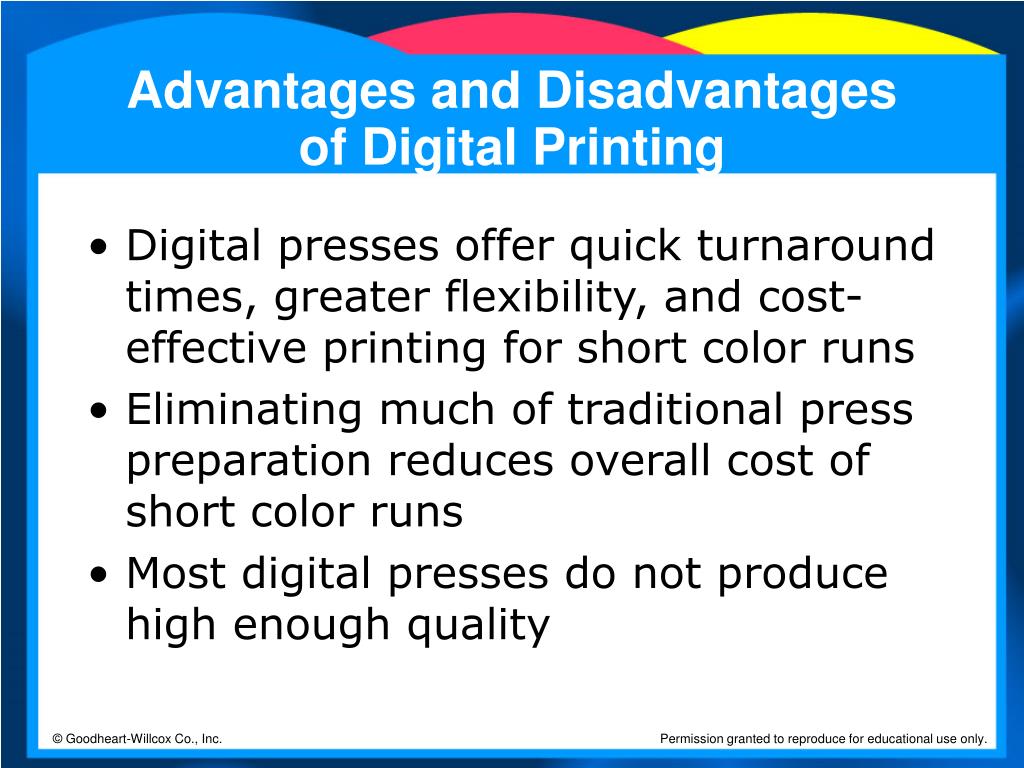The Basic Principles Of Digital Printing
The Basic Principles Of Digital Printing
Blog Article
Not known Facts About Digital Printing
Table of ContentsDigital Printing Things To Know Before You BuyThe Of Digital PrintingSome Ideas on Digital Printing You Need To KnowThe Buzz on Digital PrintingEverything about Digital PrintingThe Best Guide To Digital Printing
Variable information printing, such as direct mail with individualized codes and addresses, is ideally suited for electronic printing. Digital quick printing just requires 4 actions of layout, testimonial, printing and binding to get everything done. Digital fast printing has an unparalleled benefit: print on demand.According to PMMI, electronic printing allows brand names and makers to react swiftly to customer needs while enhancing the supply chain, minimizing warehousing cost and waste, and delighting in faster time to market. That all noises excellent, yet how does this technology do all that? The significant differentiator of these modern technologies is that there are no set up fees and no plates with electronic printing.
How Digital Printing can Save You Time, Stress, and Money.
According to Wikipedia, the best distinction between electronic printing and traditional techniques such as lithography, flexography, gravure, or letterpress - Digital Printing is that there is no need to change printing plates in digital printing, whereas in these analog printing techniques the plates are consistently changed. This leads to quicker turnaround time and lowers price when utilizing digital printing.
Digital printing is extremely adaptable, so it's easy to make adjustments to the package layout quickly. It all goes back to the plates.
A lot more inventory can suggest even more waste in the future. With traditional printing approaches, short-run printing is just not possible. Due to the fact that a great style can make or damage your item, electronic printing constantly creates high-quality, clear and vibrant graphics each time. Digital printing on adaptable pouches includes the brilliant, vibrant, and specific graphics that almost beckon consumers to reach out and touch them.
Digital printing is the process of printing digital-based photos straight onto a variety of media substrates. There is no need for a printing plate, unlike with offset printing. Digital documents such as PDFs or desktop publishing files can be sent out straight to the digital printing press to publish theoretically, picture paper, canvas, textile, synthetics, cardstock and other substrates.
8 Simple Techniques For Digital Printing
According to PMMI, digital printing allows brand names and producers to react promptly to consumer demands while boosting the supply chain, minimizing warehousing expense and waste, and taking pleasure in faster time to market. That all noises terrific, but how does this modern technology do all that? The major differentiator of these innovations is that there are no set up charges and no plates with electronic printing.
According to Wikipedia, the best distinction in between electronic printing and conventional approaches such as lithography, flexography, gravure, or letterpress is that there is no requirement to replace printing plates in digital printing, whereas in these analog printing methods home plates are continuously replaced. This causes quicker turnaround time and reduces expense when utilizing electronic printing.

Top Guidelines Of Digital Printing
More stock can imply more waste down the roadway. With conventional directory printing methods, short-run printing is simply not feasible. Because a wonderful layout can make or break your product, digital printing constantly produces top notch, clear and vibrant graphics each time. Digital printing on flexible bags includes the brilliant, dynamic, and precise graphics that practically bid consumers to connect and touch them.

According to PMMI, electronic printing allows brand names and makers to respond swiftly to client demands while improving the supply chain, reducing warehousing expense and waste, and taking pleasure in faster time to market. That all sounds great, yet how does this modern technology do all that? The major differentiator of these modern technologies is that there are no set-up fees and no plates with electronic printing.
The Of Digital Printing
According to Wikipedia, the best distinction in between digital printing and conventional techniques such as lithography, flexography, gravure, or letterpress is that there is no requirement to change printing plates in electronic printing, whereas in these analog printing approaches home plates are repeatedly changed. This leads to quicker turn-around time and decreases expense when using digital printing.
Rapid manufacturing implies obtaining your item to market much faster. It additionally suggests it's simpler and faster to make modifications later on, when you transform a dish, include a SKU, or develop seasonal product packaging. Digital printing is highly flexible, so it's easy to make changes to the package layout quickly. It all goes back to home plates.

The Only Guide to Digital Printing
Digital printing is the procedure of printing digital-based photos directly onto a range of media substratums. There is no requirement for a printing plate, unlike with countered printing. Digital documents such as PDFs or desktop posting documents can be sent straight to the electronic printing machine to publish on paper, image paper, canvas, textile, synthetics, cardstock and other substratums.
Report this page